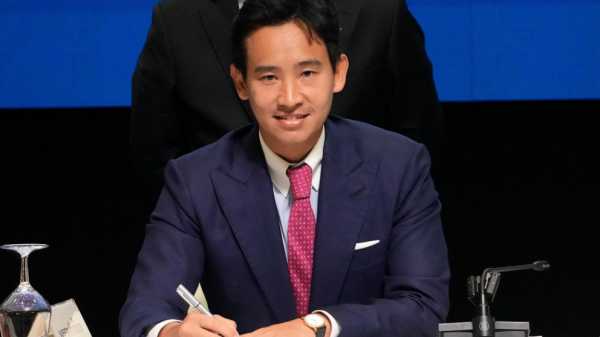
BANGKOK — Thailand’s opposition Move Forward Party. the top vote-getter in last week’s national election, signed an agreement with seven other parties on Monday on a joint platform they hope will lead to the formation of a coalition government in July.
The 23-point agreement sidesteps several volatile issues while seeking to preserve most of the agenda that brought the progressive Move Forward Party its stunning May 14 victory, in which it captured 152 seats in the 500-member House of Representatives by promoting change after nine years of conservative army-backed rule.
The most contentious issue, amendment of a harsh law against criticizing the monarchy, was not included in the pact.
That proposal had been part of Move Forward’s campaign platform, and many younger Thais would like to see it considered along with other democratic reforms. However, the monarchy is considered a pillar of Thai national identity and conservatives oppose any changes to the law, which provides for penalties of up to 15 years in prison.
Some of the eight parties did not want to be associated with even mild calls for reform of the law.
The pact says, “All parties agree that every mission that the government will do must not affect the country’s status as a unitary state, the country’s status as a democracy under a constitutional monarchy framework, and the inviolable status of the monarch.”
Move Forward Party leader Pita Limjaroenrat said the negotiations were “fruitful, comprehensive, and a good start.”
“I’m prime minister-elect and there are several roadblocks as you understand it, but we have a strong team to manage it, and hopefully, to be able to minimize risk and minimize the destabilizing factors that have affected the economy.”
The electorate’s mood for change was underlined by the second-place finish by the opposition Pheu Thai party, a longtime antagonist of the army whose last government was ousted by a military coup in 2014.
The eight parties signed the agreement at a news conference on Monday, exactly nine years after current Prime Minister Prayuth Chan-ocha seized power as army chief in the coup.
Monday's agreement includes several of Move Forward’s core policies, such as drafting a new more democratic constitution, passing a same-sex marriage law, decentralizing administrative power and transitioning from military conscription to voluntary enlistment “except when the country is at war.”
It also calls for reforms of the police, military, civil service and the justice process, abolition of business monopolies, and the restoration of controls on the production and sale of marijuana after its poorly executed de facto decriminalization last year.
The eight-party coalition controls 313 seats in the lower house, a strong majority, but that is not enough to assure it can take power. Under the military-drafted constitution, the prime minister is selected by a joint vote of the lower house and the Senate, whose 250 members were appointed by the post-coup military government. That means the winning candidate needs at least 376 votes and will almost certainly need some support from the Senate, a solidly conservative royalist body.
Several of the points in Monday’s agreement required fine-tuning.
It calls for a “Marriage Equality Act to ensure equal rights for all couples, regardless of gender,” but adds the qualification that it should be done “without infringing upon the religious principles each individual adheres to.” The wording is seen as important for the support of the nine-seat Prachachat Party, whose base is socially conservative Muslims in southern Thailand.
Prachachat’s concerns are also singled out in the clause on monopolies, which targets the highly protected big producers of alcoholic beverages.
“Abolish monopolies and promote fair competition in all industries, such as alcoholic beverages, with Prachachat Party reserving their right to disagree on the alcohol industry only, due to religious reasons.” it says.
The pact includes a section on general principles which says that “All parties have the right to advocate for additional policies as long as they do not contradict the policies outlined in this agreement.”
Sourse: abcnews.go.com






